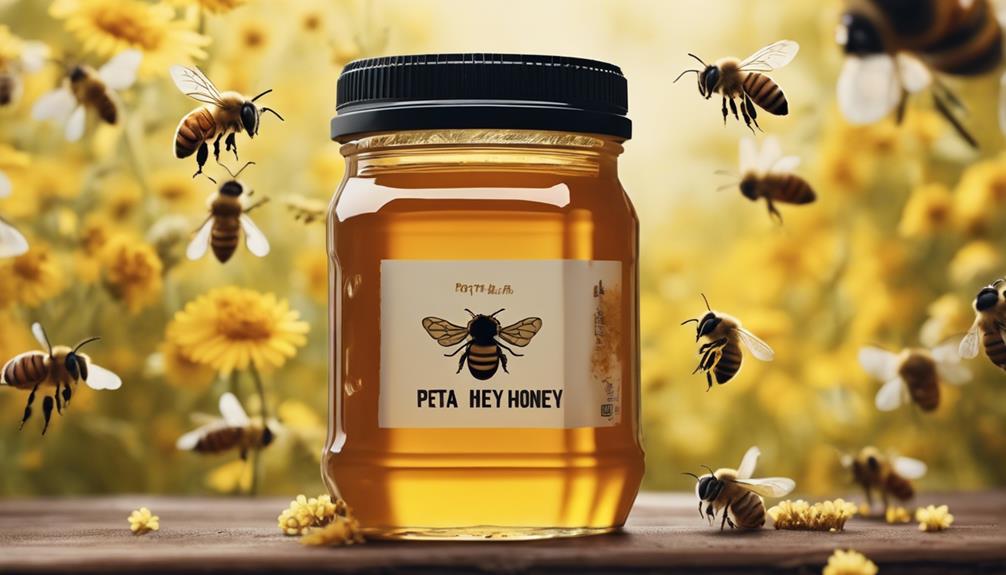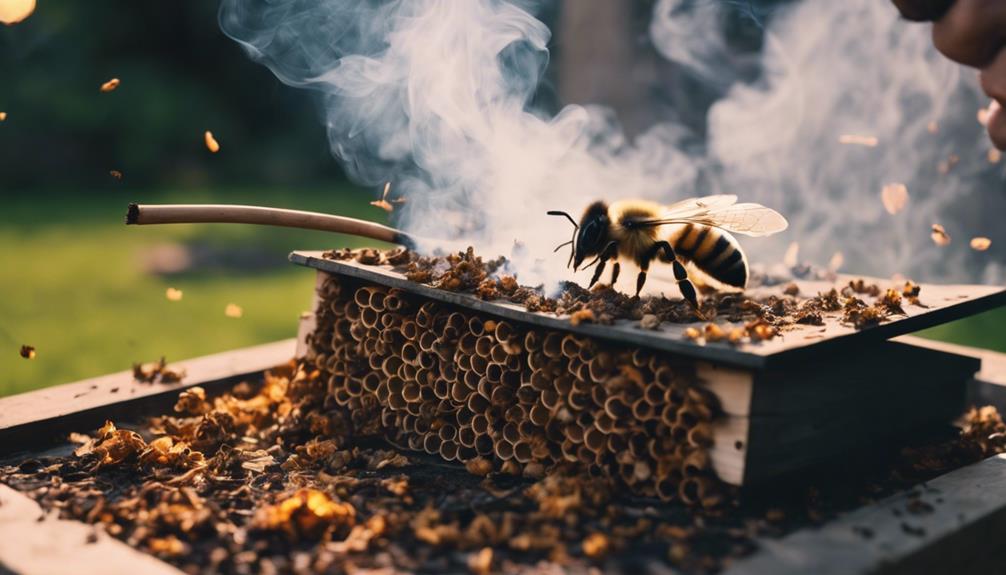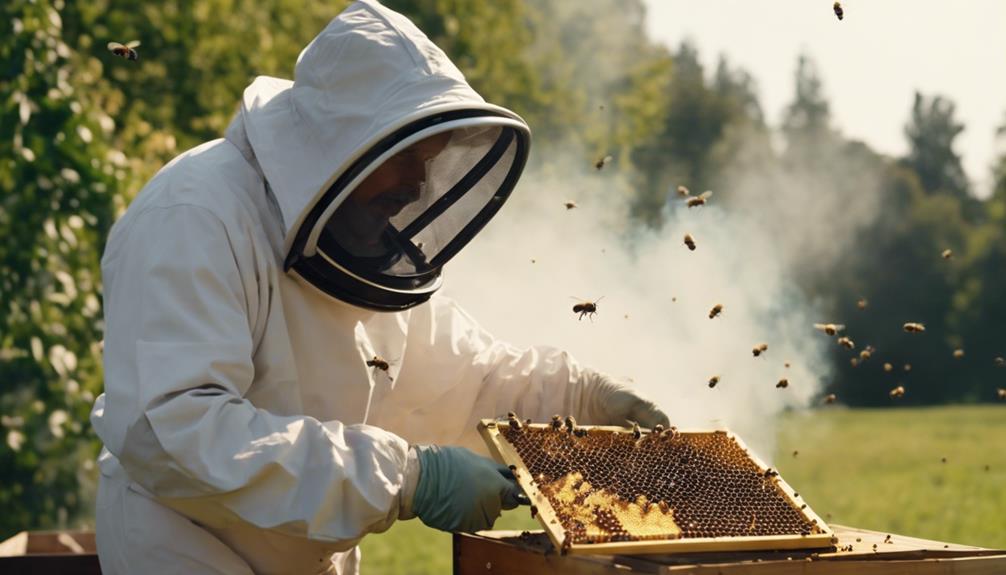In regards to honey, PETA raises awareness about the importance of considering bee welfare and ethical beekeeping practices. They emphasize the bees’ vital role in the ecosystem and how commercial honey collection methods impact their populations. Referring to honey as ‘bee puke,’ PETA ignites discussion on ethical food choices, advocating for awareness on the implications of honey consumption.
The health benefits like phytochemicals and antioxidants in honey are explored, alongside the ethical concerns in honey collection. Explore further into PETA’s position on honey to uncover a world of sustainable and cruelty-free beekeeping practices that support a healthier environment and compassionate food industry.
Main Points
- PETA advocates for ethical beekeeping practices.
- Highlighting the importance of considering bee welfare.
- Emphasizing the impact of commercial honey collection on bee populations.
- Supporting sustainable and cruelty-free honey production.
- Encouraging consumer awareness of ethical implications in honey consumption.
PETAs Stance on Honey Production
In our perspective, honey production is considered crucial by PETA due to the bees’ labor being harvested for human consumption. PETA emphasizes the significance of considering bee welfare in the production of honey.
Bees play an essential role in our ecosystem, and their well-being should be a priority in any activity involving them. Commercial honey collection practices often prioritize maximizing production, potentially harming bee populations.
Ethical beekeeping practices, advocated by PETA, focus on ensuring that bees are treated with respect and care throughout the honey production process. By raising awareness about the impact of honey production on bees and advocating for more ethical approaches, PETA prompts us to reflect on our choices and consider the welfare of these essential animals.
Controversy Over Honey Labeling
Discussing the controversy surrounding honey labeling, PETA generated significant debate by referring to honey as ‘bee puke‘ in a viral Facebook post. The post stirred up a storm, with many expressing their disagreement and defending the benefits of honey.
Backlash and trolling ensued online, igniting discussions on ethical food choices and animal welfare. Social media became a battleground for differing views on the ethics of honey consumption post-PETA’s bold statement.
While some appreciated the push for awareness, others felt the portrayal was extreme. The debate highlighted the intricacies of maneuvering food choices in a world where every bite can have ethical implications.
What’re your thoughts on this honey debate?
Health Benefits of Honey Discussed
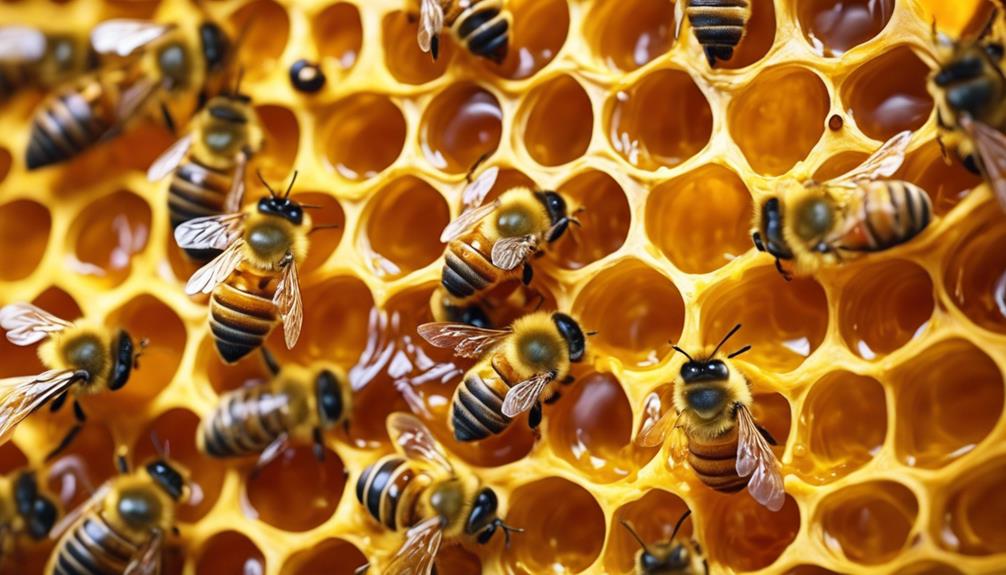
Exploring the myriad health benefits of honey reveals its remarkable impact on overall well-being and energy. Real honey is packed with phytochemicals, anti-inflammatory properties, and antioxidants that work wonders for our health.
Not only does honey help lower blood pressure and regulate heart rate, but it also boosts cell function. Its antimicrobial properties contribute to overall well-being. Additionally, honey is a champion for skin health and wound healing, making it a go-to natural remedy.
Some advocate for real honey over vegan alternatives, citing its natural medicinal properties. The next time you reach for a sweet treat, consider the array of health benefits that come with a spoonful of this golden goodness.
Ethical Concerns in Honey Collection
Highlighting ethical concerns in honey collection, PETA sheds light on potential harm to bee populations. Here are three key points to take into account:
- Sustainable Practices: PETA advocates for sustainable honey production methods that prioritize the well-being of bee populations.
- Cruelty-Free Approach: Commercial honey collection practices may exploit bees for human consumption, prompting the need for cruelty-free alternatives.
- Consumer Awareness: Essential for consumers to be mindful of the ethical implications of honey consumption on bee populations. By choosing products that support bee welfare, consumers can contribute to a more sustainable and compassionate food industry.
Impact on Bee Populations
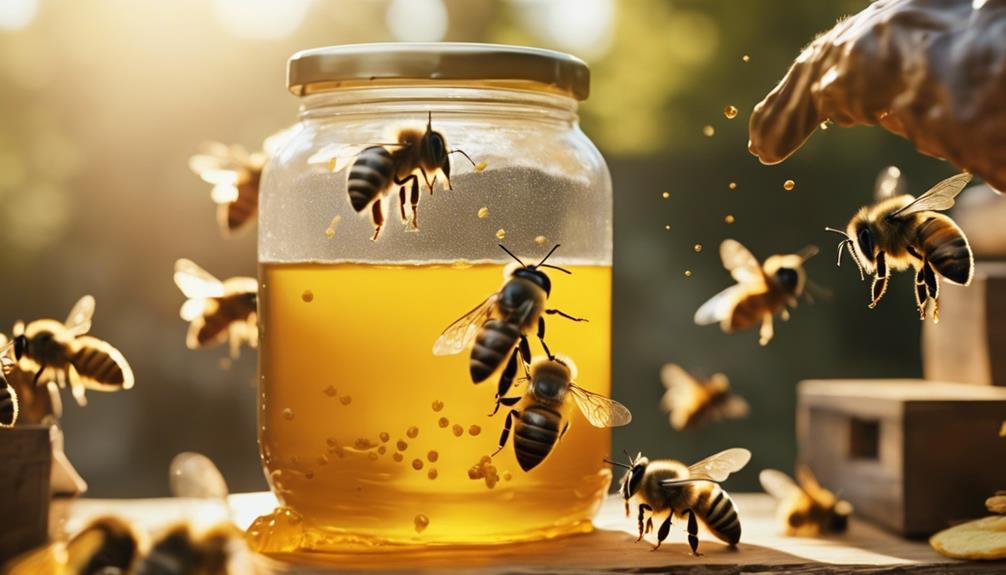
Bee populations have experienced significant declines due to various factors such as disease, pesticides, and climate change. Industrial beekeeping practices, aimed at maximizing honey production, have inadvertently harmed honeybee populations and other essential pollinators. Surprisingly, native bees, often overlooked, are actually more efficient pollinators and less affected by the stressors plaguing honeybees.
Despite this decline, bees are essential for commercial pollination, with honeybees alone playing a crucial role in enabling 75% of food crops to exist. This decline in bee populations should concern us all, as it has far-reaching effects on our environment and food supply. Organizations like PETA advocate for sustainable practices that support all bee species, highlighting the interconnectedness of our ecosystem.
Consumer Considerations for Honey Consumption
Regarding honey consumption, it is essential to consider the points raised by PETA. Understanding their stance on honey, ethical sourcing practices, and the health benefits associated with this sweet treat can guide our choices.
Exploring these aspects allows us to make informed decisions that align with our values and support sustainable food practices.
PETA Stance on Honey
When thinking about honey consumption, it’s essential to acknowledge PETA’s stance on the ethical treatment of bees and the impact of commercial honey collection practices on bee populations. Here are three key points to keep in mind:
- PETA views honey collection as the exploitation of bees for human consumption, emphasizing the importance of respecting animal rights.
- PETA advocates for ethical beekeeping practices that prioritize bee welfare, promoting sustainable food choices that align with cruelty-free principles.
- PETA raises concerns about how commercial honey practices can harm bee populations, encouraging consumers to be mindful of the impact of honey production on bee well-being.
Ethical Honey Sourcing
To guarantee ethical honey consumption, consumers should prioritize supporting local, sustainable beekeepers who value bee welfare and nutrition. Choosing honey from such sources assists in bee health and conservation efforts. Sustainable beekeepers focus on humane methods and minimal interference with bees, respecting their essential role in ecosystems.
By selecting honey produced with care and consideration for bee welfare, we play an important part in promoting ethical honey sourcing practices. Supporting beekeepers who prioritize bee nutrition not only benefits the bees but also guarantees that we’re consuming a product that aligns with our values.
Ethical honey sourcing is a way for consumers to make a positive impact on bee welfare and the environment while enjoying the sweet rewards of nature’s hard-working pollinators.
Health Benefits of Honey
Considering the numerous health benefits associated with real honey, consumers are encouraged to investigate its phytochemical, anti-inflammatory, antimicrobial, and antioxidant properties for overall well-being.
Regarding honey’s health perks, here are three essential aspects to ponder:
- Phytochemical Power: Real honey contains a variety of phytochemicals that contribute to its natural healing properties, making it a valuable addition to your diet.
- Anti-Inflammatory Action: The anti-inflammatory properties of honey can aid in reducing inflammation in the body, potentially benefiting those with inflammatory conditions.
- Antioxidant Armor: With its antioxidant properties, honey acts as a protective shield against harmful free radicals, promoting better health and well-being.
Supporting Sustainable Food Sources
We support sustainable food sources by advocating for ethical ways to harvest sweeteners, such as agave syrup and Bee Free Honee. These alternatives guarantee that bees aren’t harmed during the production process, promoting a more compassionate approach to food consumption.
Sustainable Beekeeping Practices
Sustainable beekeeping practices play a crucial role in supporting ethical and cruelty-free honey production, emphasizing the well-being and natural processes of bee populations. Here are three key points to ponder:
- Bee Health: Prioritizing bee health is at the heart of sustainable beekeeping, ensuring that bees are well cared for and their needs are met to maintain strong and thriving colonies.
- Environmental Conservation: By adhering to sustainable practices, beekeepers contribute to environmental preservation, promoting biodiversity and ecosystem health.
- Respect for Natural Behaviors: Ethical beekeeping practices honor the natural behaviors of bees, allowing them to express their instincts and behaviors without undue interference.
Supporting sustainable beekeeping not only benefits the bees but also leads to the production of honey in a more conscientious and eco-friendly manner.
Ethical Harvesting Methods
Prioritizing the well-being of bees during honey collection is essential for supporting sustainable food sources. Ethical harvesting methods not only benefit bee populations but also safeguard the environment. Beekeepers play a vital role in ensuring the welfare of bees by adopting bee-friendly approaches that don’t exploit their labor.
By considering the impact of honey harvesting on bees and the ecosystem, we can promote sustainable practices that align with animal welfare principles. Sustainable honey production isn’t just about the end product; it’s about respecting the intricate balance of nature.
Together, we can make a difference by advocating for ethical practices that prioritize the well-being of bees, ultimately contributing to a healthier environment for all.
Ethical and Cruelty-Free Food Choices
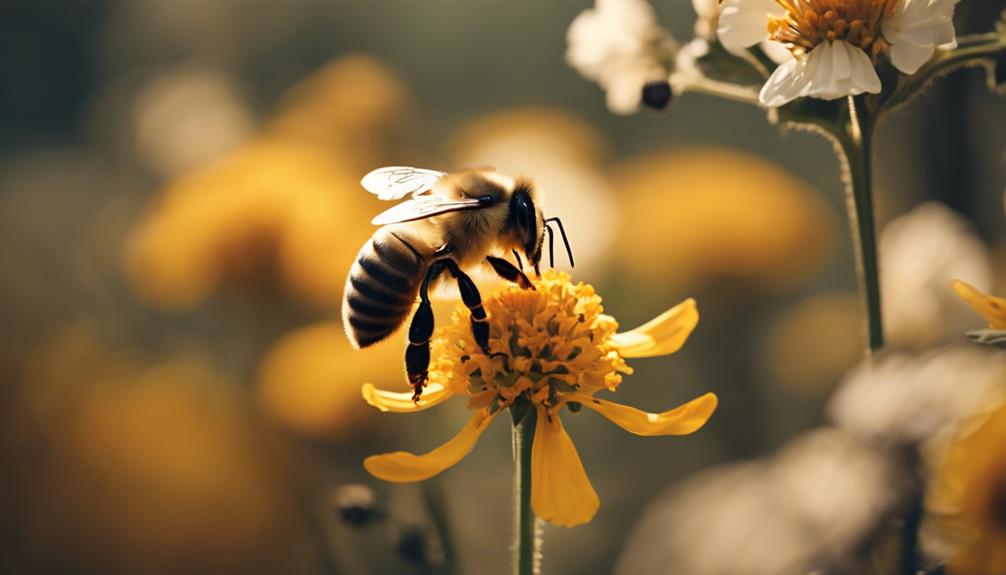
When contemplating ethical and cruelty-free food choices, prioritizing practices that promote the well-being of animals is essential.
To make informed decisions about honey production, it’s vital to take into account factors such as:
- Sustainable Practices: Supporting beekeepers who prioritize sustainable methods helps guarantee the long-term health of bee populations.
- Ethical Sourcing: Choosing honey from sources that uphold ethical standards in beekeeping demonstrates a dedication to cruelty-free food choices.
- Consumer Awareness: Being knowledgeable about the impact of commercial honey collection on bee populations empowers individuals to make choices aligned with their values.

Roger Thomas is a seasoned beekeeper and hive architect with a deep-seated passion for sustainable living. His fascination with bees has shaped his professional career, giving him practical and theoretical expertise in bee behavior, colony health, and optimal hive conditions. Roger’s technical skills shine in his bespoke hive creations that cater to the specific needs of diverse bee species, while his sustainable practices promote environmental balance and the wellbeing of the bee population.
As he continues his journey in beekeeping, Roger has become a dedicated advocate for responsible practices and an insightful educator in his field. His posts aim to inspire new beekeepers, underline the importance of sustainability, and showcase the remarkable contribution bees make to our ecosystem. Roger invites you to join him as he delves into the world of bees and the rewarding, honey-sweet art of beekeeping.
